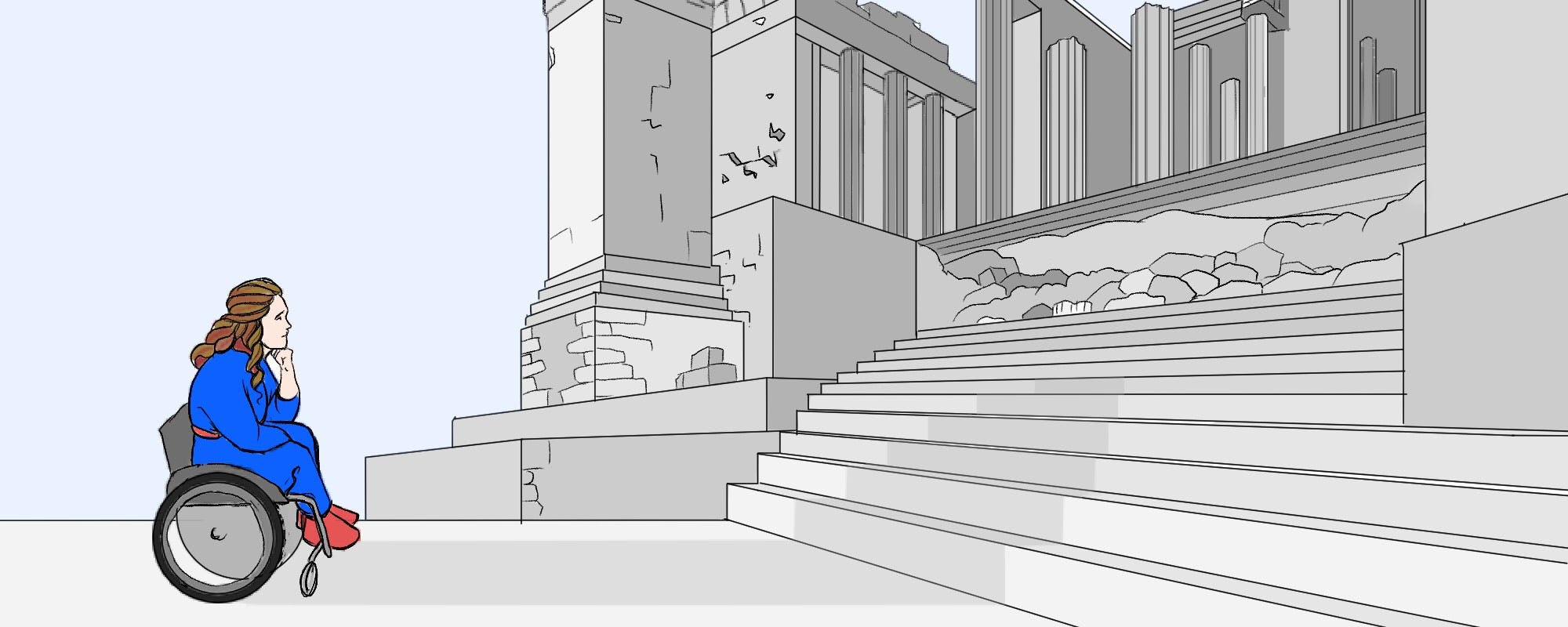Hehir, "Toward Ending Ableism in Education" and Judith Butler and Sunaura Taylor "Examined Life":
Hehir describes Ablesim in the education system and its impact on students with disabilities. Those disabilities could either be an IEP, being deaf, being blind or other disability that a person may have. People have different attitudes or beliefs about students or people with disabilities. Hehir describes a mother and her son who were born with a disability and their experiences as a parent of a disabled child and a child with a disability. Hehir states, "At a workshop for parents of disabled kids, Penny was told that she had to go through a period of mourning the arrival of her disabled child. DEpply insulted Penny's response was, "I have lost a child at birth and I have had a disabled child. I know the difference. My son is a gift, not a tragedy"(2). Penny, the mother of Joe, was sharing the frustration she had with the workshop due to what they believe about her child and other children with disabilities. Saying that when her disabled child was born she had to mourn, is incredibly rude and terrible because even though Joe has a disability he is still a person and has a life to live.

Hehir later writes about the "poster child" of children with disabilities. These children need your help, and it is terrible to have a disability and these children will never achieve anything amazing or spectacular in their lives. Hehir writes, "Cyndi Jones, a disability activist and former poster child, argues that 'the poster child says it's not okay to be disabled... but it says if you just donate money the disabled child will go away'"(4). Jones was explaining the terrible message that the "poster child" is sharing with people about children with disabilities. If people just ignore those with disabilities or just think giving money to them makes a difference it doesn't. Disabled people should be treated like any other person and shouldn't be babied, but that doesn't mean we should help them as we would any other person. This relates to the video "Examined Life" as Judith Butler and Sunaura Taylor talked about Sunaura's disability she described going to the coffee shop and carrying her coffee cup in her mouth, and people seemed shocked or confused. Instead of staring or judging, people could offer to help her even if she doesn't want or accept the way she is carrying her cup because she can't hold a cup of coffee in her hand like other people tend to do. Hehir later described the term "supercrip", which is a disabled person who did something that people don't expect a disabled person to be capable of.
Hehir later talks about how the education system for deaf children started off fine but took a turn for the worse when "oralism" entered the classroom. Oralsim taught deaf children through lip-reading and speaking, but this wasn't successful for all deaf students because it was extremely difficult for deaf children to learn this way. Hehir states, "Leo Jacobs, a deaf educator, compares lip-reading with breaking eighty in golf or painting a masterpiece, since under the best of circumstances only 30 percent of speech can be read from lip movements (Jacobs, 1989)"(8). Leo Jacobs explains that is very difficult for a deaf person to learn to lip reading because it isn't always possible to understand what someone is saying. Deaf children are now encouraged to learn American Sign Language as soon as possible, which allows them to be very successful.
This reading and video open eyes to more of the struggles that students and people with disabilities face either in school or in the world. Teachers still have work to do to make the classroom welcoming to all students with disabilities or without disabilities. Teachers should educate themselves on a student's disability in their classroom, so they can understand what struggles their students face and what they could do to make their students successful in their class. Society has more work to make all buildings accessible for people with disabilities, so it shows that people with disabilities are welcome in our society.


Hi Leo! I like that you brought up the poster child/supercrip section of the reading; society will only show respect or admiration for a person with disabilities if they do something extraordinary, and otherwise, society treats disabled people as a burden or tragedy. I agree that this creates very harmful self worth issues for disabled people as they are receiving the message that they are incapable of being respected as people, just as they are. I also really like the last image you included, as even without any words written, it is very impactful. The image speaks for itself...
ReplyDeleteHi leo! I like the picture you put at the end because that happens more often than not. Society makes it difficult to be disabled. If everything was disabled friendly, they could do everything without having to be a "burden" or ask for help. Ramps, electric doors, and elevators are all examples of things that we use often and are meant for disabled people.
ReplyDeleteHello Leo! I really like your point about the poster child. Disabled people shouldn't feel like lesser people just becuase of whatever they may have. They are people like the rest of us and should be treated as equal.
ReplyDeleteI think that ableism is a tough problem to solve, but it's not the same as mental disability. That being said, it's certainly a problem in our society, and we could or should do small things, such as making businesses more handicap accessible, and I think that the state should sanction funding for this.
ReplyDelete